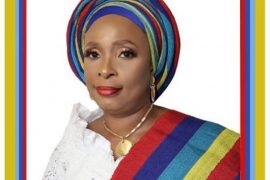Madam Afi Amoro, the Founder and Chief Executive of Jandel Limited, a top-level event management company in Ghana, over the last 20 years has brought in class, creativity, and innovation to change the face of the industry.
The Ghanaian entrepreneur shared with Amazons Watch Magazine how she turned her hobby and passion into a successful business. Madam Afi also shared her business thoughts and some of the ways she grooms, influences and impacts the lives of girls and women across Ghana. Excerpt:
Kindly tell us about yourself and what were your experiences, growing up as a young girl?
I am a 59-year old Entrepreneur, Founder and CEO of Jandel Limited, with 20 (twenty years) of experience in the total event management business which includes management of state, corporate and private events such as weddings and parties. We also have subsidiaries that provide construction, interior decoration, horticulture and landscaping, and purchasing and supply. I am a proud single parent of two beautiful adult daughters, Dela and Janette whose names were coined to form Jandel. Growing up in a middle-income family, I started my basic education at the St. Theresa’s preparatory school. The zeal to excel was inculcated in me by my parents who encouraged me to do my best in anything and everything.
Despite being on the heavy side, I was the one called upon to chase my brothers and bring them to have their bath or to be punished. I took any assignment given me very seriously. Because of this, my father had nicknames for me such as ‘Mighty” which in essence implied I could be more than the little roly-poly girl I was because my weight never deterred me from doing anything. My mother was more concerned about academics. She drove me 4 times a week to the local library, arranged extra classes in the subjects I was weak in, and attended all PTA meetings. She was also responsible for the spiritual growth of the family. Her diligence and perseverance ensured that I gained admission to one of the best Secondary Schools in Ghana- Holy Child School.
I continued to Ola Girls Secondary School where I successfully completed Advanced Level education. Continuing to the university became a near impossibility as no matter how many times I rewrote my troublesome papers I could not make the grades to qualify. I wrote it 3 times and gave up! But only temporarily; there were only 3 universities in the country then and entry was very competitive. I went on to study and became a secretary. I worked as a secretary for 17years. I have a Diploma in Public Administration, a degree in Business Administration and an MBA in Human Resource Management and various national and international certificates all as a mature student.
Please tell us what inspired you to try entrepreneurship?
I was working in the civil service while at the same time moonlighting as a florist. This conversion of a hobby into a business was encouraged by people offering to pay me for my services. So my business started from a need to supplement my meagre salary to provide a better quality of life for my family. I was the first child so a lot rested on my shoulders.
The demand for my services eventually grew when I went back to the University as a matured student. I found myself multi-tasking as a single parent, a student, a worker and a founder of a fledgeling business. Having assessed the viability of the business, it became necessary to concentrate and grow it. The growth of the business was determined by my client’s demands. If you need it, I would find a way of providing it. I just had to make a little profit on it. So I would subcontract, observe and implement it myself the next time. From a one-man employer, that is I, I grew the business to 3 employees, then 6 employees, and now I have 62 workers with various levels of qualification.
Being a proponent of education, I have always invested in improving the quality of my staff and myself by attending short conferences and workshops which helped to update my knowledge and creativity in the field.
Entrepreneurship is about creativity and innovation to provide solutions to unmet needs and as I realised that the middle-income earners in the country were growing, and the appetite for certain services increased, there was the need to fill this gap. Entrepreneurship is also about providing employment to others and supporting them with their growth and development; a path which I have chartered with certain key principles; for example, employing raw and unskilled labour, nurturing and developing them to become skilled professionals. We are proud to mention that, our staff turnover has been quite minimal. This makes it easier to run the business because delegation and execution is more efficient. We have not hesitated to train our staff internationally and locally to continuously improve and deliver the quality of service we are known for.
My advice to up and coming women entrepreneurs is to stay focused in your quest for excellence in your chosen field of endeavour. Set your mind and heart right and do not let failure deter you. I am most humbled by the blessing God has given my children and I, in the things that money cannot buy, such as love, loyalty, health and sustenance. He has also given me the insight that you can fall down, but you can still get back up, and when you get up, learn from your mistakes. So strong beautiful African women, when you fall down, rise, dust yourself up and chin high, walk again, because with God in your boat, you can sail through the storm.
How do you balance your family and work life? Has your professional life in any way affected your family life?
I had the blessings of caring parents (Mr and Mrs Jackson) who supported my desire to start and grow my business. They nursed my children and I had peace of mind to go on working till the early hours of the morning knowing that my children were safe. However, I still made time for fun things and had quality time with my family. I also kept Sundays relatively free so I could help them with homework etc.
Young ladies across Africa fantasize about career ideas but are not able to actualize them due to societal limitations. What is your take on this and how have you been able to sidestep some of these challenges?
Lack of access to finance is indeed a challenge to budding entrepreneurs in the continent but it should not be a deterrent. The stories of big conglomerates in the world all had very small beginnings and when an entrepreneur starts with that principle that they can grow the business one level at a time, you realise that, it grows even faster than you ever anticipated. Although there is a challenge, take the big step and let your courage lead you to a comfortable venture.
What we have as ladies in between our legs, may help to climb a few steps in the social, corporate and business ladder, but it will not sustain it. Self-preservation, your dignity and tenacity of spirit, integrity and above all, the fear of God in everything that you do will take you to unimaginable heights.
“Keep your face always towards the sunshine and shadows will fall behind you” (Walt Whitman).
As a young woman, I had come through two failed marriages and my determination to rise above my sorry situation and take care of the children was a huge driving force. So I worked hard and persevered in the midst of all challenges. There always has to be something that drives you, and you need to identify that in your life as that is what will drive your success.
Our findings reveal that you were appointed to the Board of Microfinance And Small Loan Centre (MASLOC) in 2009 by the then President of Ghana. Based on your experience at the board, how do you think the continent can address gender disparity in terms of financial inclusion and scale-up women’s access to finance in Africa?
Traditionally, women in developing nations have an intrinsic entrepreneurial gift in them. They have engaged in little businesses to support their children and family from time immemorial. Businesses such as weaving baskets, selling food and being porters are some little businesses women do. It is the conversion of this into a viable venture that is a grey area.
As a board member of Masloc, we observed that the majority of our applications came from women and they were better at repayment. Hence voluntarily, Masloc helped more women to stand on their feet and this was further enhanced when we encouraged them to form cooperatives so that they could police each other in the repayment of loans. This enabled them to return for even bigger financial help to help grow their individual and collective businesses. It was a beautiful thing to see – the tomato seller who initially could afford only a basket load was now able to order a truckload to sell in other parts of the country. The basket weaver now earned foreign exchange by improving on the quality of her wares because they were attracting international buyers.
We have also seen a number of banks in Ghana with specific financial products that are gender-biased. This is also helping women grow their businesses exponentially.

Over the course of your professional life, how have you been able to influence the lives of women positively?
I have leveraged on my business at Jandel to provide training for girls and young women and to develop their skills in their fields of endeavour. Many of them have used the knowledge and skills provided to them to establish and manage their own businesses. We have also provided financial assistance to students in the tertiary institutions who have come back to help in the development of the company from one point or the other. We also organise short courses where we bring together local and internationally recognised speakers to guide, demonstrate and inspire our women.
At Jandel, our female to male employment ratio is 6:4. This is geared towards supporting women to grow and develop skills that can sustain them in future. Our corporate social responsibility programs have mostly encapsulated women programs and activities where we have provided numerous financial supports, award recognition programs and sponsored activities. Some of these sponsored women programs include among others the’ Love Ball” which raised funds for the Go Red for Women Ghana Foundation” – an annual breast cancer awareness program; the Superwoman Awards which rewards women impacting lives and society at large through their businesses and chosen careers. The “LoveBall”, also raises funds, proceeds of which go to support women and children charities.
I also mentor women and girl groups in my church and have been on numerous TV and radio programs to encourage women in their business quest. All these are geared towards supporting girls and women to build financial independence, sustainable businesses, wellness and wellbeing. In 2016, I was nominated to represent the Ghanaian woman entrepreneur at the Japan-Africa Business Women Exchange Seminar in Tokyo, Japan, where I delivered a presentation to share experience and business ideas with other women from Africa and Japan on best business practices for growth and sustainability.
I have also received a number of awards such as Most Outstanding Interior Design Professional at the Feminine Ghana Achievement Awards 2016 and Event Management Entrepreneur Of the year 2015 at the Ghana Entrepreneur Awards 2016.
What do you think can be done to curb actions that bring about marginalization along gender lines?
Historically, women have been pushed to the background and accorded less importance in society inadvertently because of lack of skills and ability to pursue similar roles like their male counterparts. Also, men generally see women as unequal to them being labelled as the heads of the family, which sometimes extends to institutions, the workplace and society at large.
It would go a long way if women had more representation in government, and parliament to influence the decisions that are made to favour the cause of women. It would also help if women enhance themselves through education, build knowledge and skills and become more responsible, self-aware and independent. A common and united front to help each other or bring up the girl child to be financially independent and responsible will uproot any agenda of being rendered powerless, ignored, accorded less importance, or kept in an undesirable state.
Severe punishment may also be meted to organizations and individuals who deliberately put women at a disadvantage.



